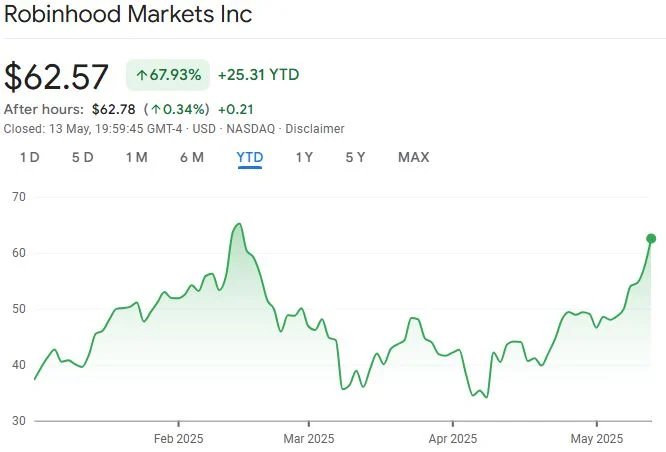TLDR
- eToro completed its IPO raising $620 million with shares priced at $52, higher than the proposed $46-$50 range
- The company begins trading May 14 on Nasdaq under the ticker ETOR with a valuation around $4.2 billion
- eToro’s net income grew from $15.3 million to $192.4 million last year
- Crypto now accounts for 25% of eToro’s trading revenue, up from 10% previously
- BlackRock expressed interest in purchasing $100 million of shares at the IPO price
Israel-based trading platform eToro has finally made its public market debut, raising $620 million in an initial public offering that exceeded expectations. The company priced its shares at $52 each, above its initial target range of $46 to $50 per share.
The trading platform sold nearly 12 million shares in total. About half came from eToro itself, raising approximately $310 million for the company. The other half came from existing shareholders cashing out portions of their holdings.
Trading is set to begin on May 14 on the Nasdaq Global Select Market. The company will use the ticker symbol ETOR, making it easy for investors to find the stock when it goes live.
The successful IPO values eToro at around $4.2 billion. While this is a huge accomplishment, it’s worth noting that this valuation is less than half of what the company might have been worth in its earlier public offering attempt.
eToro first tried to go public in 2022 through a special purpose acquisition company (SPAC) deal. That merger would have valued the company at more than $10 billion but was canceled during a market downturn.
The Road to Wall Street
The path to this IPO wasn’t straightforward. eToro began making confidential filings with the Securities and Exchange Commission in January. They publicly announced their IPO plans on March 24.
However, the company had to temporarily put its plans on hold. Market uncertainty following President Trump’s April 2 tariff announcements caused many companies to delay their public offerings.
eToro wasn’t alone in this pause. Other companies like online lender Klarna and ticket reseller StubHub also shelved their IPO plans during this period of market uncertainty.
Founded in 2007 by brothers Yoni and Ronen Assia along with David Ring, eToro has built a business that directly competes with Robinhood. Both platforms aim to make investing accessible to everyday people.
Robinhood, which went public in July 2021, has seen its shares rise more than 67% year to date. It closed at $62 per share on May 13, near its all-time high of $65 from February.

The success of Robinhood may have helped create a favorable environment for eToro’s market debut. Investors familiar with the trading platform business model had already seen strong returns from a similar company.
eToro makes money through various fees related to trading, including spreads on buy and sell orders. It also generates revenue from non-trading activities such as withdrawal fees and currency conversion charges.
The company’s financial performance has been impressive. Net income jumped nearly thirteenfold last year to $192.4 million from $15.3 million a year earlier.
eToro has been expanding its crypto business at a rapid pace. Revenue from cryptoassets more than tripled to over $12 million in 2024. One-quarter of its net trading contribution last year came from crypto, up from just 10% the year before.
BlackRock, the world’s largest asset manager, showed confidence in eToro’s prospects. According to the IPO prospectus, BlackRock expressed interest in buying $100 million worth of shares at the offering price.
eToro’s CEO Yoni Assia has long maintained that going public was part of the company’s strategy. In early 2023, he told CNBC, “We definitely are eyeing the public markets. I definitely see us becoming eventually a public company.”
eToro’s successful IPO might signal growing market appetite for new offerings. This could be good news for other companies planning to go public soon.






